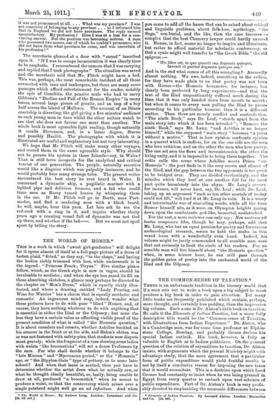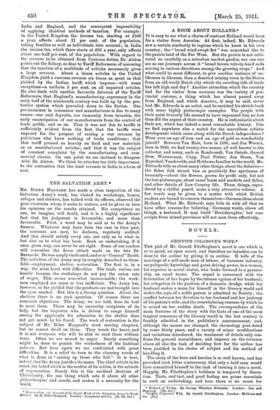THE COMMON-SENSE OF TAXATION.*
THERE is an unfortunate tradition in the literary world that if a man sets out to write a book upon a big subject he must produce a big book in order to gain attention. Yet many little books are frequently published which contain, perhaps, more thought, and certainly less padding, than the impressive big volume. Such a one is Dr. Alaton's little book on taxation. He calls it the Elements of Indian Taxation, but a more fully descriptive title would be the " Common-sense of Taxation, with Illustrations from Indian Experience." Dr. Alston, who is a Cambridge man, was for some time professor at Elphin- stone College, Bombay, and probably thence derives his special Indian outlook. His book, however, is fully as valuable to English as to Indian politicians. On the general question of the relation of expenditure to taxation, Dr. Alston insists, with arguments which the present Ministry might with advantage study, that the mere agreement that a particular form of public expenditure would yield fruitful results is not by itself a conclusive reason for imposing the new taxes that it would necessitate. This is a doctrine upon which Lord Cromer had constantly to insist when he was being pressed in Egypt from every quarter to embark upon vast schemes of public expenditure. Part of Dr. Alston's book is very profit- ably devoted to emphasising the economic differences between • Elements of Indian Tanatton. By Leonard Alston. London : Macmillan and Co. [2.. set
India and England, and the consequent impossibility of applying identical methods of taxation. For example : in the United Kingdom the income tax, starting at £160 a year, affects about 11 per cent. of the population, taking families as well as individuals into account; in India the income tax, which there starts at £66 a year, only affects about one-half per cent. of the population. With regard to the revenue to be obtained from Customs duties, Dr. Alston points out the fallacy, so dear to Tariff Reformers, of assuming that the taxation of a multitude of articles necessarily gives a large revenue. About a dozen articles in the United Kingdom yield a customs revenue six times as great as that yielded by the Indian tariff, which imposes—with some exceptions—a uniform 5 per cent. on all imported articles. He also deals with another favourite delusion of the Tariff Reformers, that England's manufacturing supremacy in the early half of the nineteenth century was built up by the pro- tective system which prevailed down to the forties. Our pre-eminence in commerce and manufactures is due to many causes—our coal deposits, our immunity from invasion, the early emancipation of our manufacturers from the control of trade guilds, and so on. That it was not due to tariffs is sufficiently evident from the fact that the tariffs were imposed for the purpose of raising a war revenue by politicians who knew nothing of trade conditions ; that that tariff pressed as heavily on food and raw materials as on manufactured articles ; and that it was the subject of constant complaint by the manufacturing and com mercial classes. On one point we are inclined to disagree- with Dr. Alston. We think he attaches too little importance to the contention that the land revenue in India is a form of rent.











































 Previous page
Previous page